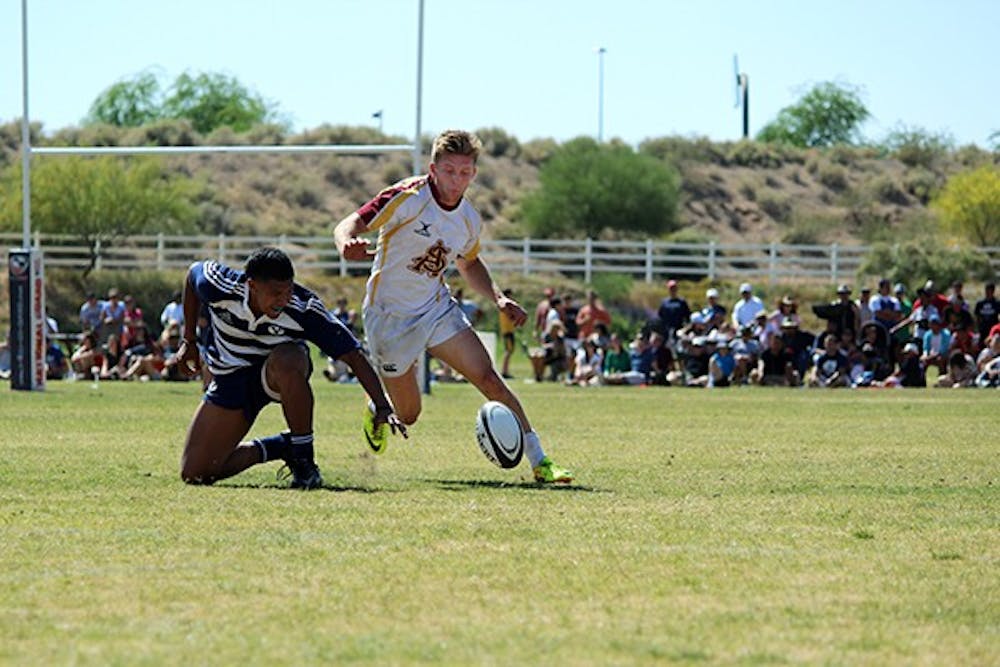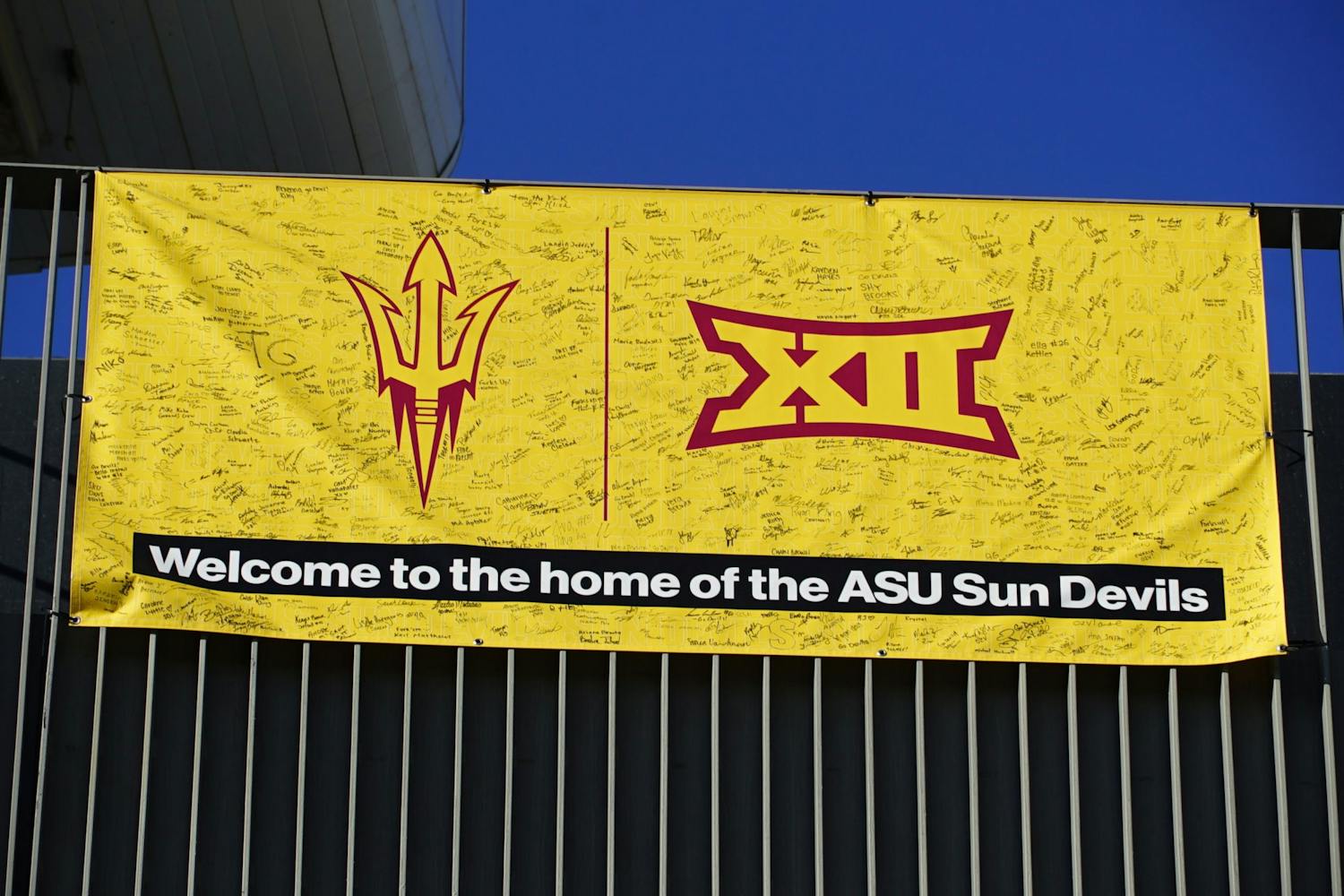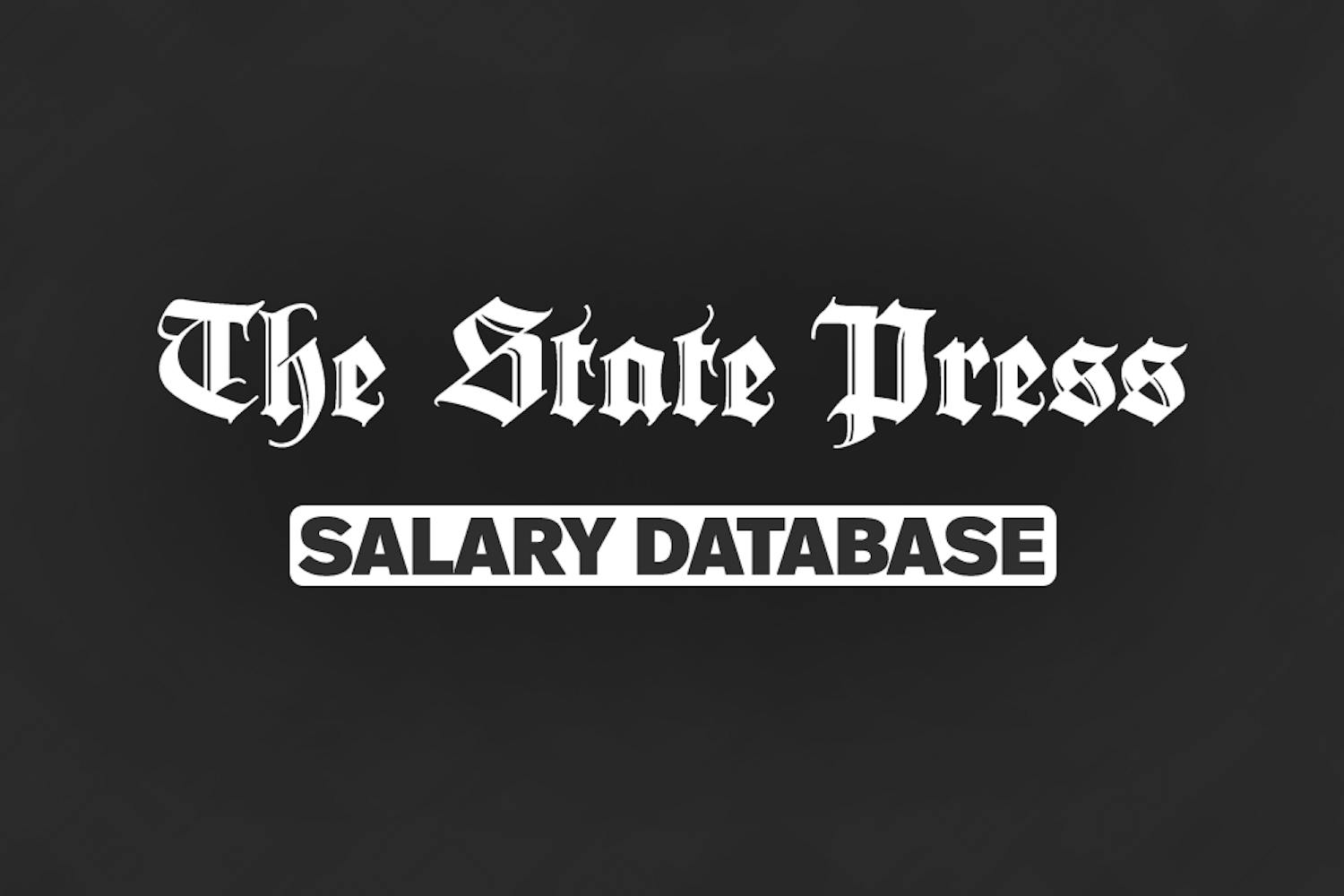Produced by Vianka Villa | Multimedia Reporter
As a Harley Davidson chopper revved its engine and drove onto the field, the festivities for the first annual Fiat of Scottsdale Rugby Bowl officially began Saturday.
Motorcycles, live music and food trucks from around the Valley complemented ASU rugby’s final match of the season against No. 1 BYU.
Spectators had a variety of seating options. From traditional metal bleachers to couches that lined the sideline to bringing in their vehicles and tailgating, there was an eclectic selection of views for fans.
Popular Valley haircutter, V’s Barbershop, even donated barbershop chairs, placed next to an orange Maserati in the end zone.
Of course, the most popular choice was the tents that provided shade from the 90-degree heat. Both the BYU and ASU fan tents were packed to the brim in both maroon and gold and blue and white.
While the score was lopsided — a 52-26 BYU victory — the attendance was not. Sun Devils and Cougars evenly filled the tents, couches and bleachers.
 Eight man freshman Ryan Koewler performs a line-out at the Rugby Bowl against BYU on April 12. ASU lost against BYU 52-26. (Photo by Alexis Macklin)
Eight man freshman Ryan Koewler performs a line-out at the Rugby Bowl against BYU on April 12. ASU lost against BYU 52-26. (Photo by Alexis Macklin)That was the idea behind bringing the top collegiate rugby team in the nation to Scottsdale, Rugby Bowl spokeswoman Jennifer Parks said.
“(BYU) has such an amazing rugby program,” Parks said. “The East Valley has such a big population of BYU alums. It was just a natural fit.”
The idea of the Rugby Bowl was hatched in the mind of Jason Rose, founder of Scottsdale-based public relations firm Rose+Moser+Allyn. It wasn’t his first go around with an event of this kind, though.
Rose is the mastermind behind the most-attended polo event in the U.S., the Scottsdale Polo Party. After the success of the Polo Party — expanding it to a two-day event with about 12,000 attendees in just its fourth year — Rose wanted more. He set his sights on rugby.
Similar to polo, rugby isn’t a mainstream sport in the U.S., something that caught Rose’s eye.
“(We were) really looking for a sport that we don’t currently have a lot of … matches here in the Valley,” Parks said. “The idea behind it was to work with (ASU) and with other rugby programs to just turn it into a big event.”
One goal of the event was to “bring rugby to the masses,” Parks said. Just as the Polo Party has expanded to two days — Oct. 25 and Oct. 26 this year — they think there is the same potential for growth in rugby.
“We want to do with rugby what we’ve done with polo,” Parks said. “To take one of these sports … and really turn it into an event that can showcase the Valley and showcase ASU.”
Rose and Parks weren’t the only ones who wanted to showcase ASU; coach Gary Lane said there was something special about this team and wanted it to be seen.
“I wanted to showcase this particular team,” Lane said. “This team has just grown from strength to strength. … They work hard, and they deserve to be showcased in front of people.”
In order to put on the type of event they wanted, it couldn’t just be another rugby match. There had to be more.
 Senior center Adam Sandstrom punts the ball away from a BYU player in the Rugby Bowl in Scottsdale on April 12. ASU lost against BYU 52-26. (Photo by Alexis Macklin)
Senior center Adam Sandstrom punts the ball away from a BYU player in the Rugby Bowl in Scottsdale on April 12. ASU lost against BYU 52-26. (Photo by Alexis Macklin)“We’ve got motorcycles, food trucks, entertainment by two bands; we’ve got a World of Beer Garden,” Parks said. “We can showcase some great local players and bring in a team from out of state, which is good for tourism. It’s good for Scottsdale, (and) it’s good for the Valley.”
And it was.
More than 3,000 people flocked to WestWorld of Scottsdale for the first-ever Rugby Bowl.
“We did it,” Rose said, gleaming with excitement after players shook hands and the match was over. “For a first-year event, it was off-the-charts.”
“This is what rugby is about,” Lane said. “People partying and hard rugby.”
Despite dropping the match to the defending national champions, Lane and his team celebrated another successful season and top-15 ranking in front of the hard rocking tunes of Keltic Cowboys, self-proclaimed as “Arizona’s premier Irish rock band."
Many of the 3,469 attendees stuck around to drink from a selection of brews available at the World of Beer Garden at the event and take in the music with the team.
Even though his team lost, Lane said the event accomplished exactly what he hoped it would.
“We just wanted to do something for the rugby community as a whole,” Lane said. “To show the Valley that rugby is a great sport, and that you can have a great time at a rugby game.”
Between the environment, attendance and opponent, it was the biggest rugby match of senior captain Tommy Boyle’s career — at least stateside.
“Only in Argentina (have I played in front of a crowd this size),” Boyle said. “It means a lot to have a venue like this and have so many people come out and show support. I was awestruck.”
 Freshman left wing Alex Sandstrom hugs a coach after the Sundevils lost to BYU 52-26 at the Rugby Bowl on April 12. (Photo by Evan Webeck)
Freshman left wing Alex Sandstrom hugs a coach after the Sundevils lost to BYU 52-26 at the Rugby Bowl on April 12. (Photo by Evan Webeck)Boyle has led the charge of the growth of ASU’s rugby program. Without it, the Rugby Bowl wouldn’t have been possible.
“ASU was just a natural fit for us,” Parks said. “I know for ASU, this was important for them to come out here and play BYU.”
While ASU rugby hasn’t grown into being a national power yet — Boyle said there are a select few, including BYU — Lane has been able to lead the team to new heights in the past five years. The Sun Devils have been ranked in the top 15 consistently and just played the two-time national champion to a closer match than they did in 2012, when they lost 54-13.
“This program is getting better every year, and it’s getting better exponentially every year,” Lane said. “Our goal is to be on the other side, to be the national champion, and I don’t think we’re far off.”
In his four years on the team, eventually leading to him becoming president of the club, Boyle has experienced the growth of the rugby program from the inside.
“These past four years have been really special to me,” Boyle said. “Just to watch the club progress as it has — we’ve made strides since I came in as a freshman. … We have much better connections through the University. We’re traveling. We just have a better overall attitude.”
ASU isn't the only place rugby is gaining popularity. A 2010 study by the Sporting and Fitness Industry Association found that rugby was the third-fastest growing team sport in the U.S., behind only softball and hockey, seeing 8.7 percent growth.
Between 2006 and 2011, there was an 84 percent growth in U.S. high school rugby players, up to about 28,000. The U.S., however, is playing catch up with much of the world when it comes to rugby.
Just as American football rules in the U.S., its derivative, rugby, is the national sport of seven nations and will be an Olympic event at the 2016 games in Rio de Janiero.
Recruiting plays a big part of college rugby, as it does for every college sport. But as the sport continues to grow, being able to recruit well begins to pay off even more.
Both Boyle and Lane emphasized how much out-of-state, and even out-of-country, recruiting means in club sports. The ability to sell a program far away from a player’s home and family without the means of an athletic scholarship is difficult — only the top club programs are able to do so successfully.
Of the 25 players on the 2013-14 ASU varsity rugby squad, 21 of them come from outside of Arizona. Of those 21, six come from outside the U.S., as far away as junior Jack Corry’s hometown of Sydney.
 Coach Gary Lane celebrates with his team after the Sundevils lost against BYU 52-36 at the Rugby Bowl on April 12. Lane said he felt good about the outcome because they played competitively against two-time national champion BYU. (Photo by Alexis Macklin)
Coach Gary Lane celebrates with his team after the Sundevils lost against BYU 52-36 at the Rugby Bowl on April 12. Lane said he felt good about the outcome because they played competitively against two-time national champion BYU. (Photo by Alexis Macklin)“We need to keep establishing rapport and keep proving ourselves when opportunities like this come around, and I think we did that today,” Boyle said. “We’re the real deal, and we’re going to make a lot happen.”
The rugby team isn’t the only ASU club sport to have seen success recently. The ASU hockey team won a national championship following the same model as rugby. Only five of the 29 hockey players are from Arizona, with nearly a third coming from Canada.
Lane paid attention to the national championship run this season and said he’s happy to see other club sports at the University win on a national stage.
While ASU rugby won’t be competing for a national title this season, it will be back in Scottsdale next season for the second installment of the Rugby Bowl.
“You’ll see more people, more time, more teams, more energy, more fun next year,” Rose said. “It’s very rewarding to see … everyone have a great time out here.”
He is already preparing to have four teams compete in two matches and said he expects attendance to double, between 6,000 and 7,000 people.
Reach the sports editor at ewebeck@asu.edu or follow him on Twitter @EvanWebeck




